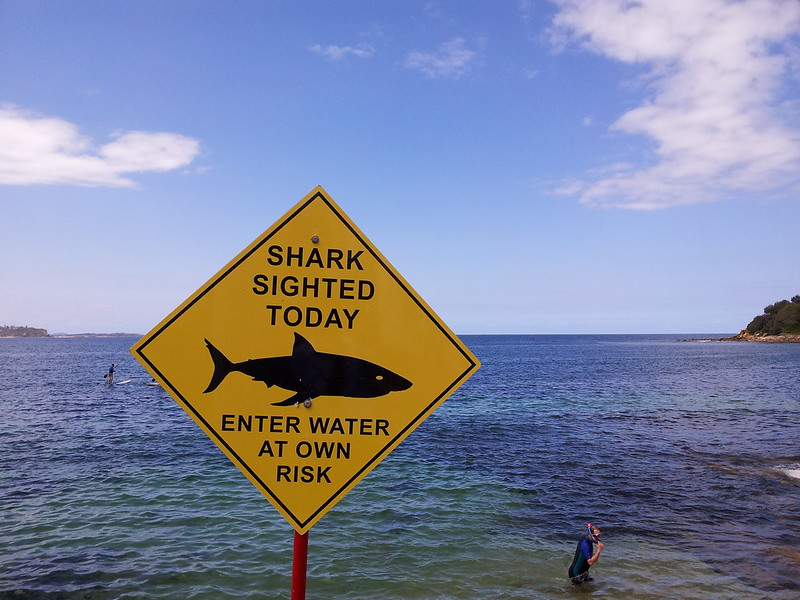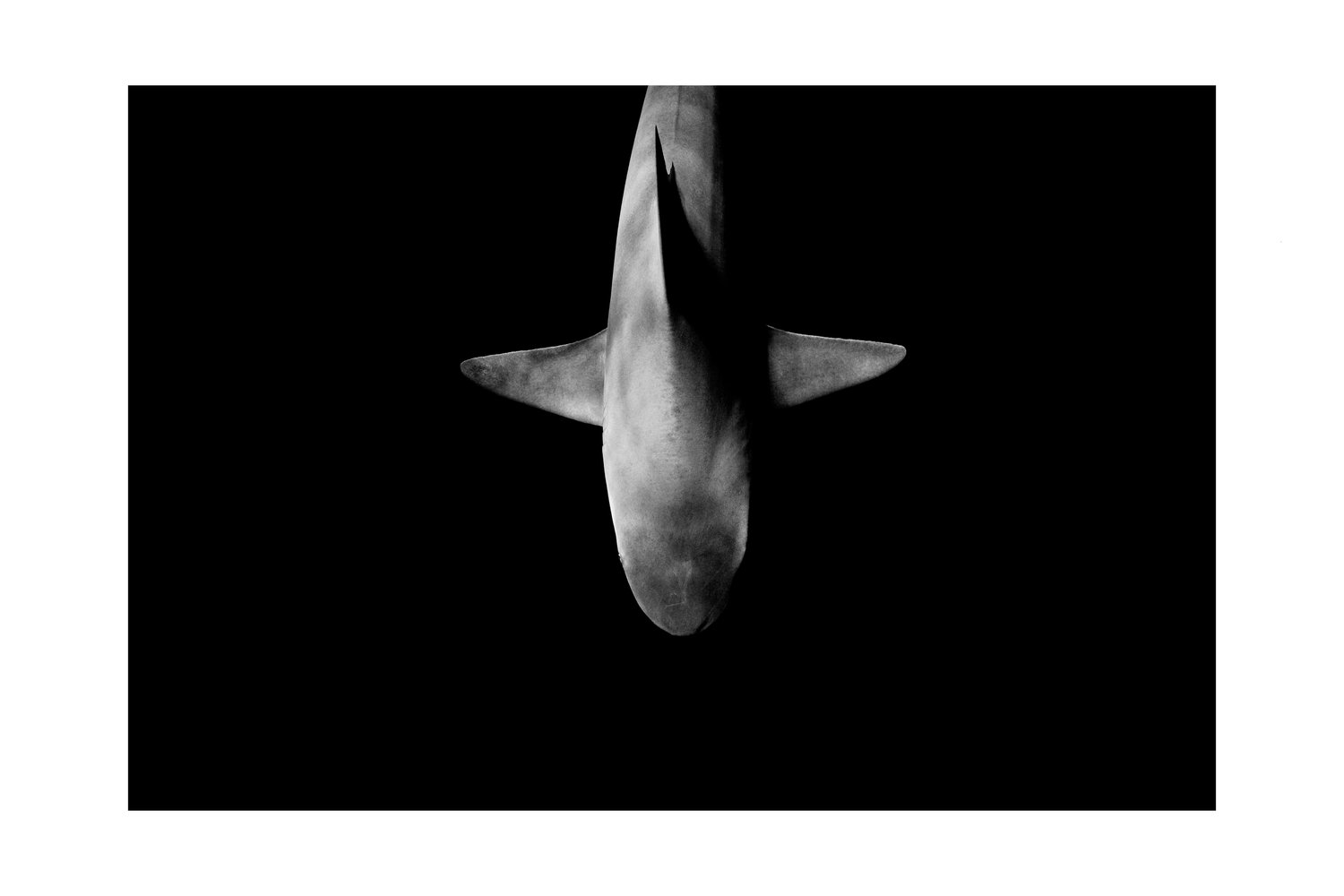| Creator | Matt Draper |
| Media Form | Photograph |
| Genre | Marine Life |
| Technique | Black and white, natural light |
| Date and Location of Creation | 2021 |
| Species Represented | Shark |
A few years ago I had a dream that provided ample evidence for this claim. Now, of course, I cannot remember why this would be the case, but the thought is amusing and rattles around in my brain from time to time. I am a vivid dreamer, and sharks have drifted in and out of my dreams for as long as I can remember. One of the first dreams I can recall having involved sharks. It was a classic nightmare, of course, as I had only ever seen depictions of scary sharks. In it, my father had somehow obtained the ability to think things into reality, and he accidentally thought of sharks swimming through the air, and the threat was that my family would picked off one by one. Yet, although I woke up scared out of my mind, I did not get the feeling that the sharks were dangerous. It felt almost like an otherworldly influence to place sharks in the center of my dream as a thing to be feared (but not by me), and has remained a player in my memory ever since. Since then I have had a number of dreams that featured sharks, including the most recent, which claimed that God was a shark.
It’s not that much of a stretch. According to an article by Elizabeth Pennisi, many researchers claim that the first definitive animal fossils are about 570 million years old, and according to the Natural History Museum, the earliest fossil evidence of sharks dates back 450 million years. That makes sharks some of the oldest creatures on earth! They are incredibly varied, are cartilaginous (also known as chondrichthyes), and use electroreception as a “sixth sense” to help them experience the world around them. For a long time it was even believed that they were immune to cancer. It seems the more we learn about these ancient creatures, the more there is to learn. Some sharks can even experience parthenogenesis—a scientific term for what is effectively a virgin birth (not unlike a certain Biblical someone). Suddenly, the idea that God could be a shark doesn’t seem so far off. A misunderstood creature far older than ourselves, with senses we can’t even imagine, even fulfilling prophecies. And, as someone who grew up in a Christian household, I often heard the phrase “fear of God”, something that is certainly applicable to these beautiful creatures.
Movies such as “Jaws” and “The Meg” have done plenty to stir up fear of sharks. Not to mention the ridiculousness of “Sharknado” being centered around the horror of shark attacks in unexpected areas. Talk about godly power—to be able to harness the power of a natural disaster to achieve unbelievable goals is most certainly something that is put into God’s hands. “The Meg” (2018) put an enormous, extinct shark in a similar position to great beasts like Godzilla, making them a fearsome foe that (for reasons that eluded me in watching the film) must be battled and defeated by man. Yet, somehow, the characters state things like “Man vs meg isn’t a fight. It’s a slaughter.” The idea that a shark would intentionally target humans in clever ways shows up again and again in the movie. Meanwhile book Jaws by Peter Benchley frequently refers to the great white as a mindless or stupid fish, which had me wondering not only about the intelligence of sharks but how we interpret and measure intelligence in animals (granted, it is implied later in the book that the shark is actually quite smart). Is something that consumes in a mindless fashion scarier than something which plans a kill, like the raptors in Jurassic Park? To make matters worse, characters say things like “Sharks are like ax-murderers… There’s something crazy and evil and uncontrollable about them” (38) which is a rather straightforward way to describe something vile. I’ve had friends afraid to go into the ocean, even known kids to hesitate in swimming pools for fear of sharks. But while Jaws is known for its horror and its ability to inspire fear, it is not limited to that. One character says in admiration that “It’s the kind of thing that makes you believe in a god. It shows you what nature can do when she sets her mind to it” (253). So perhaps I am not alone in wondering about the influence of God when it comes to sharks. Regardless, I’ve always taken issue with the idea that we should be afraid of God, and I’ve taken a much more passionate issue with the idea of being afraid of sharks.

This sign warns beachgoers of shark sightings. Others use even harsher language, like “DANGER” to let people know that there may be sharks in the area. But are sharks really an imposing threat on beachgoers? According to the Florida Museum website, from 2009-2018 fatalities from dog bites occurred over 5x more than fatalities from shark bites. Shark attacks really don’t happen all that frequently (at just over 100 reported in 2022), and there were nearly as many provoked bites as unprovoked. After all, we are the ones entering their space, often looking like a delicious seal-snack. After thinking about these shark warning signs and the movies I’ve seen, I started thinking about other kinds of depictions of sharks and how they influence our perspectives and fear surrounding sharks. Where could I find something more positive (that wasn’t also super science-nerdy, because that would be a mile long post).
The featured image by Matt Draper is a peaceful one, looking down from above a shark with a dark, empty background and natural light shimmering on the shark’s back. It offers a perspective wholly unlike those of the aforementioned shark films, one where the shark depicted is at peace and nonthreatening. I originally found Draper’s Instagram account when he was working on a project focused on the idea that we should “replace fear with fascination”. The Instagram account no longer has any traces of this campaign, but there is a wonderful podcast episode where he discusses the concept.
This shift in mindset, from fear to fascination, is one that I find to be personally inspiring. It is definitely a mindset I have used throughout most of my life. It’s not like I’ve never been afraid of things, but I try to convert that fear into curiosity and eventually understanding, which tends to make the world seem much friendlier (or, at the very least, more hospitable). Sharks deserve our fascination—they are super cool. But there are plenty of other things that are deserving of this shift, and I’d encourage everyone to approach life with this idea in mind. I’ve encountered sharks in the wild twice. The first was at a fair distance while swimming off the coast of Cape Cod, and the two of us were, for lack of a better phrase, like two ships passing in the night. The second was off the coast of Florida, when I swam through a deep pocket in the water that was teeming with fish—and a small shark, hardly a foot away from me. For a moment, my heart leapt out of my chest, and I nearly went swimming away in a panic. But I got myself to pause and swim with care, watching all the while as the little guy went about his day. In that moment, I let fascination take over my experience, and it is one of my favorite memories to date.
Thankfully, when it comes to sharks, it’s not just Draper who is encouraging this shift. The first ever shark week took place in 1988 and “started as a counterpoint to the negative representations of sharks in popular culture” according to Kelli Bender with People Magazine. Of course, not all the sharks that appeared in shark week were without traditional violent depictions. Even in “Finding Nemo“, while the sharks are introduced as friendly and attempting to go against their traditional diet of fish, there is an eventual slip back into bloodthirsty violence. The shift towards fascination is slow-going, but I believe we are making progress.
And what about my dream? Is God a shark? Well, that’s the thing about God. No one can say anything for certain, and I can’t put any stock in such a claim, even if my dream made some compelling (forgotten) arguments. But I can say I am curious about a lot of things, and sharks have a habit of swimming through my thoughts.




